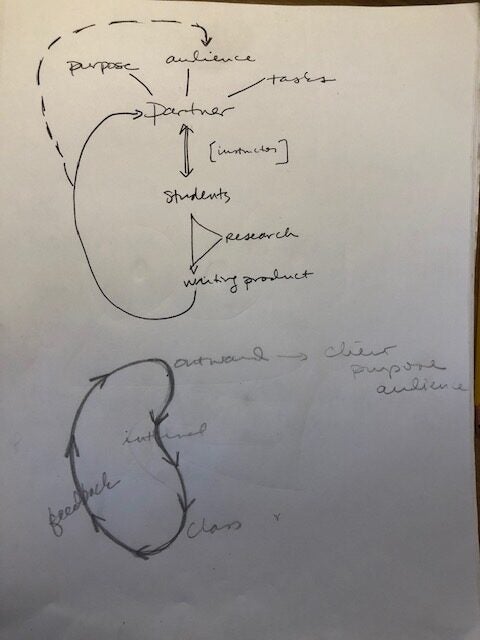About Writing for Others
What is Writing for Others (W4O)?
Echoing Georgetown’s Jesuit maxim to be “people for others,” Writing for Others (W4O) is a model for first-year writing courses that challenge students to complete writing projects for campus partners or DC-area partners. W4O began in 2019-2020 with a grant from Georgetown’s Enhancing and Transforming the Core initiative.
The W4O model combines principles of service learning, postpedagogy, and public writing. A W4O course partners with another office/department/organization, shaping the entire course around helping that office/department/organization meet a need. Students collaborate throughout the semester to design, write, and propose an intervention to a specific rhetorical problem.
We distinguish W4O from historical service learning models through our emphasis on collaborative partnerships, as well as a pedagogical focus on public writing, the role of student choice, and the de-centering of the faculty role.
Why do it?

Writing is a critical rhetorical practice that weaves through our students’ lives, linking what happens in the classroom with other campus experiences and with their professional and civic roles. In all of these settings, writers must synthesize knowledge, make strategic choices about how to communicate their insights, and collaborate with others to produce new knowledge.
Unfortunately, students often view writing as an academic exercise designed to demonstrate their learning solely to their professors. Writing for Others aims to change that view by promoting authentic writing projects in which students apply their learning to address the needs of specific audiences and problems.
Such projects make concrete the practice of adapting the content, structure, and style of communication to meet the needs of particular audiences. When students write for real audiences who face genuine and complex problems, they experience writing as a means of acting on the world. In the process, they become more invested in both the subjects they are studying and in their writing.
Students move away from writing for their professors, constrained by genre, length, audience, and question and are able to receive feedback on their work from other people.
Fundamental shifts:
- From writing to answer a question to writing to intervene in a problem
- From writing for a classroom audience to writing for a (more) public audience (interaction with other campus people/groups)
- From individual writing to distributed authorship
- Design approach vs./with a process approach
- Classroom space operates differently—the “teacher” role changes to “project manager”
